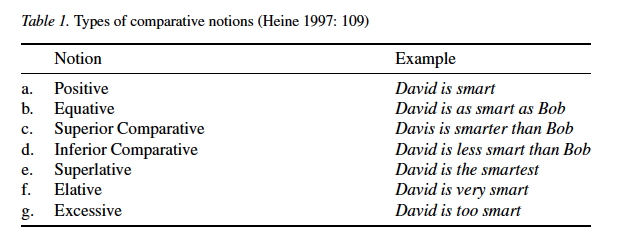In English and other languages there are three degrees of comparison: positive, comparative and superlative (e.g. tall, taller, tallest). Are there languages with more than three degrees, expressed morphologically?
-
4There is elative (meaning: very) and its opposite - attenuative (meaning: a bit, somewhat, rather). They are different kinds of intensification, however there is no comparison (they are absolutes). So they're not really degrees of comparison.– Alex B.Commented Jun 12, 2012 at 17:28
-
3@Cerberus I can envision a degree for "the least tall of all"– Otavio MacedoCommented Jun 12, 2012 at 18:00
-
3@OtavioMacedo "talleast"– acattleCommented Jun 13, 2012 at 2:25
-
2linguistics.stackexchange.com/questions/1376/…– Alex B.Commented Jun 13, 2012 at 22:32
-
2@hippietrail: Welsh has a distinct equative. In fact, I'm going to make that an answer.– Colin FineCommented Jun 14, 2012 at 23:16
2 Answers
At first, some general remarks on comparison and terminology. My answer is mostly based on Pierluigi Cuzzolin's research.
Let's start with some definition of comparison. Cuzzolin and Lehmann 2004 give the following definition:
"Taken as a grammatical category, comparison (German Steigerung) is the formal modification of some predicative word – most often an adjective – representing a parameter of gradation or comparison, according to the extent to which it applies to its argument, relative to some standard" (p. 1212).
Thus, comparison as a grammatical category includes "semantic" comparison (relative) and gradation (absolute).
Any comparison must contain at least the following three elements: the comparee, the parameter (a cognitively salient feature), and the parameter marker (a morpheme expressing a degree).
Secondly, Heine has a nice table on types of comparison. Naturally, there is some variation in terminology - but this is irrelevant here.

Cuzzolin and Lehmann 2004 argue that traditionally three degrees of comparison are recognized:
- the positive degree;
- the comparative degree, which can involve comparison of majority (smarter), comparison of minority (less smart), comparison of equality (as smart as), and even sameness (known as similative);
- the superlative degree.
Although comparison usually occurs on adjectives and adverbs, it can occur on other parts of speech, too:
Italian canzonissima 'the best song'
Basque gizonago 'more man'
The most important thing to remember about comparison is that it can be expressed by different means: morphologically, syntactically (for examples see Cuzzolin and Lehmann 2004).
Now about equative expressed morphologically (like in Welsh). Cuzzolin and Lehmann argue that it's not that common. They mention the following language groups and languages: Celtic languages, Finno-Ugric languages, Kartvelian languages, Tagalog, Indonesian, Greenlandic Eskimo, and Estonian. An example from Estonian is below:

-
Tagalog example: "Singtangkad ko ang kapatid kong babae." The prefix "sing-" means "as ... as". tangkad - tall, ko - me or my, kapatid na babae - sister. Superlative "tallest" is "pinakamatangkad". Elative "very tall" is "napakatangkad". Commented Nov 21, 2019 at 5:21
-
Why, I wonder, does Heine separate superior and inferior comparatives, but not superior and inferior superlatives (‘David is the smartest’ vs ‘David is the least smart’)? And why no inferior elatives and excessives (‘David is very little smart/hardly smart at all’ and ‘David is not smart enough’)? Commented Jul 23, 2021 at 14:28
-
@JanusBahsJacquet valid points. I have to look it up again, it's been five years since I read it last time.– Alex B.Commented Jul 23, 2021 at 15:17
Welsh has a distinct equative, as well as the comparative and superlative.
From the article linked to: teg "fair", teced "as/so fair", tecach "fairer", tecaf "fairest".
So mor teced â = "as fair as".
-
4This seems to be exactly what the OP is looking for! Could you explain what a distinct equative is and provide some examples? Maybe with interlinear glosses and all that cool linguistic stuff ;-) Commented Jun 15, 2012 at 0:42